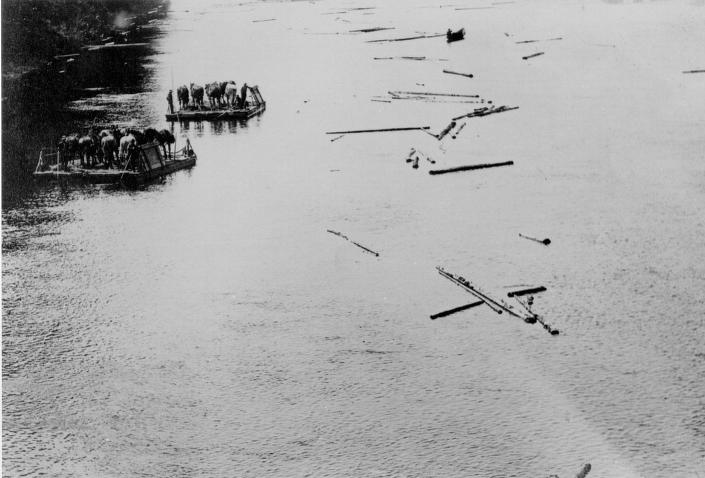




Advanced Search
| Online Collection |
|
|||||||||||||||||
|
Major rivers in America served as "highways" and "freight handlers" first for the Native peoples and then the European settlers. This photograph of a log-drive on the Connecticut River shows rafts of specially trained logging horses. These horses were used to pull apart log jams. Chains were wrapped around the ends of the jammed logs and then attached to the horses; the horses would wade into the river up to their bellies and pull the logs loose. Rafts transported the horses from place to place as needed. As early as 1683, John Pynchon sent rafts of sawn boards from Enfield to Hartford, Connecticut. For the next 300 years, the Connecticut River provided the cheapest and most direct means of transporting building-quality lumber from the plentiful forests on northern edges of New England settlements to increasingly deforested southern New England towns. Log rafts floated heavy freight from North to South in this region until the railroads took on the job in the 1860s. After reaching their destination, the log rafts were broken apart and floated to lumber mills. Log rafts were replaced by log-drives which floated heavy, bulky logs in very large numbers down the river to large lumber and paper mills that were built at falls along the river (like those at Turners Falls). The cheap transportation the river provided earned it a reputation as "the poor man's freight carrier." These low costs and efficient mills kept paper and lumber prices low through the end of the 1800s. Although the Connecticut River is no longer a major freight carrying river, many of America's river systems continue to provide cost effective transport of bulky freight such as corn from the huge grain elevators of the upper mid-west.
|
Log Driving on the Connecticut River
|
| |
Home | Online Collection | Things
To Do | Turns
Exhibit | Classroom | Chronologies | My
Collection
About This Site | Site Index | Site Search | Feedback


